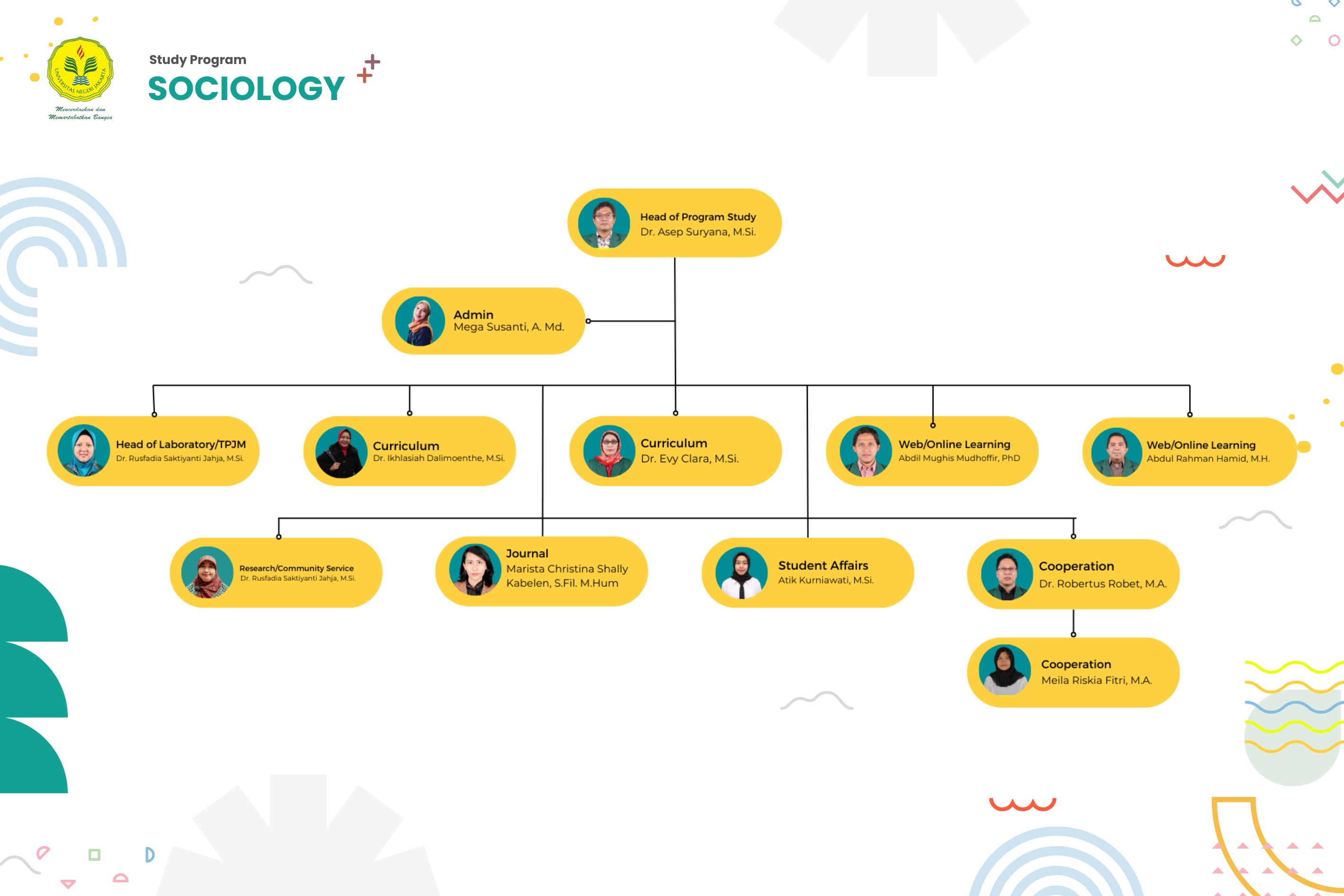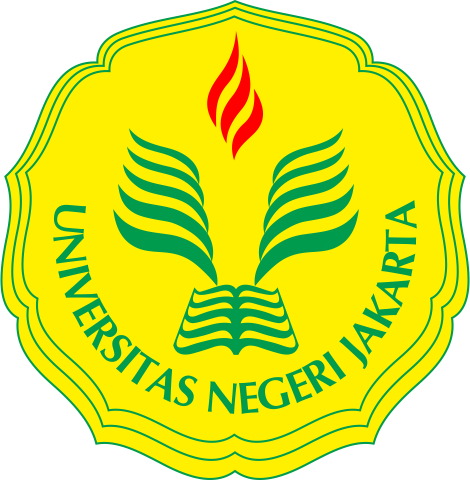ORGANIZATION STRUCTURE
GOVERNANCE SYSTEM
System and implementation of credible governance
The system and implementation of credible governance include the appointment and replacement of management at the study program level, carried out with a standard mechanism and regulated by the UNJ Chancellor’s Regulation. The main requirements set specifically for the Chairperson of the Study Program, namely the Study Program lecturer, who has a minimum rank of Lector. As for other management at the study program level, namely:
- Head of Laboratory
- Head of Quality Assurance Study Program
- Head of Student Affairs
Proposed by Study Program Coordinator to the Dean of the Faculty of Social Sciences by taking into account the capacity and capability of the lecturer concerned.
Transparent governance system and implementation.
All activities carried out and information obtained will be conveyed transparently, nothing is hidden. direct delivery is carried out through the Whatsapp Group Prodi. For matters that require mutual and fundamental agreement such as curriculum changes, scheduling, it is carried out in the study program lecturer meeting.
Starting in 2020, the study program conducts regular meetings once a week, on Thursdays at 10.00 to 13.00, for this reason, on the schedule of the lecturer meeting the scheduling of lecture activities is not and, the lecture schedule on every Thursday is only scheduled for 8.00 – 10.00 and after that 13.00 – 16.00. On Thursdays, the first and third weeks are held meetings of all study program lecturers, while on Thursdays the second and fourth weeks will be used for incidental meetings such as journal team meetings, student affairs teams, accreditation teams and others. In order for all parties to know what has been done by the study program leaders and what activities are carried out by the Study Program, starting in 2020, the Sociology Study Program has a study program web with the page: fis.unj.ac.id/sociology. This web is a form of transparency that will be carried out both in the fields of planning, implementation and evaluation.
Accountable governance system and implementation.
The implementation of lectures every semester always begins with a meeting, namely discussing the lecture schedule. Before the schedule is distributed, all lecturers are gathered to get direction and receive lecture schedules and at the same time obtain information on the results of lecturer performance evaluation in general. Evaluation of Head of Study Program performance, and evaluation of lecturer performance is carried out through a questionnaire filled out by students. Questionnaires will be conducted online through a system on Google. After the online questionnaire is complete, the study program will convey it to students through the Whatsapp Group of students per generation that has been owned, so that students fill out the questionnaire. after the questionnaire is processed, the results will be submitted in writing to the lecturer concerned by providing notes and suggestions for improvement. The results of the questionnaire will also be discussed in the study program lecturer meeting.
Meanwhile, evaluation of employees, laboratorians, librarians is carried out inherently by Head of Study Program. Administrative, library, and laboratory service procedures are regulated and socialized by each unit.
Responsible governance system and implementation
As a leader, the Head of the Study Program is fully responsible for every action, product, decision and policy including the administrative processes carried out in the Sociology Study Program. The scope of his responsibility includes the obligation to report, explain and the willingness to be questioned for any consequences that have been produced. The Head of the Sociology Study Program is in charge of planning, implementing, developing, and evaluating all study program activities, and is responsible to the Dean and Rector of UNJ.
In carrying out his duties, the Head of the Sociology Study Program and lecturers who function as teachers, assistants of student activities, and academic advisors.
In addition to being assisted by lecturers, the Head of the study program is also assisted by administrative staff, and laboratory staff, who work in accordance with their fields of work. All Study Program activities are built and implemented based on a shared commitment in a climate of openness. At the end of the year all units must provide accountability reports in accordance with their respective fields of work, including the head and other work units must provide accountability reports to the UNJ chancellor through the Dean of the Faculty of Social Sciences. This reporting is included in the Self Evaluation Report which will be conducted every semester.
Fair system and implementation of governance
The process of implementing good governance is also very much determined by the fairness factor felt by all elements of the study program. This is well realized by the leadership of the Study Program, so that various decisions taken pay great attention to this aspect. The justice in question is, for example, in the assignment of course lecturers, determining the number of students to be mentored, determining schedules and so on. By applying this principle, the academic atmosphere in the study program is always conducive. Lecturers and employees who violate the rules are given sanctions in accordance with applicable regulations at UNJ. The form of sanctions given ranges from warning letters to dismissal. Similarly, students who violate the manners of campus life will receive sanctions in accordance with the weight of the offense.
Efforts to achieve the vision and carry out institutional functions are developed by the institutional structure of the Sociology Study Program as shown in the following chart:

Head of Sociology Study Program
The Head of Study Program is in charge of leading the implementation of study program tasks set by the university, namely implementing academic programs at the department / study program level which includes the following matters:
- Improving academic quality, research, community service (Tri Dharma Perguruan Tinggi), and cooperation at the study program level;
- Developing study program work plans and programs as work guidelines in accordance with the agreed vision, mission, and goals;
- Compile and make the concept of study program development as input material submitted to the Head of the Department: development of human resources (Human Resources) through further studies, comparative studies to other universities, both nationally and internationally, training of lecturers and laboratory staff through workshops, training of administrative staff, and training of student soft skills);
- Development of student affairs, religious life, social culture, and communication at the study program level;
- Planning, implementation, monitoring, and evaluation of lectures at the study program level;
- Evaluating BKD (Lecturer Workload) every semester;
- Monitor and evaluate the implementation of lectures to improve the quality of study programs;
- Coordinating the collection of evaluation questions (both UTS and UAS and their implementation);
- Propose and report the performance of PA Lecturers (Academic Advisors) to the Head of the Department;
- Preparing RKAT (Annual Budget and Activity Plan) in accordance with university regulations;
- Bridging lecturers to conduct research and community service;
- Prepare an evaluation of the implementation of study program activities as an accountability for the results that have been achieved.
Field of Study Program
The field of work developed in the Sociology Study Program consists of four fields of work with the direction of a responsible person as follows:
- Academic Field
- Laboratory
- Student Affairs
- Quality Assurance Division
The main tasks of each field of work in the Library and Information Technology Study Program can be detailed as follows:
a. Academic Affairs
- Develop an academic manuscript for the improvement of the study program curriculum
- Creating SOP guidelines in the academic field
- Planning the development of Learning media of study program
b. Laboratory Field
- Inventorying, maintaining, and safeguarding laboratory tools and equipment, compiling programs/plans and coordinating laboratory activities in collaboration with related agencies;
- Coordinate the periodic publication of the Journal;
- Make regulations for the use of laboratory equipment through SOP (Standards of Operational Procedures);
- Submitting proposals for the procurement of laboratory equipment to be integrated into the library’s ICT (Information and Communication Technology) laboratory;
- Designing the organization of ICT-based workshops.
c. Student and Alumni Affairs
- Coordinating student activities in participating in various activities and competitions at local, national and international levels;
- Coordinating and selecting PPA Scholarship Acceptance at the study program level.
- Organizing partnerships with internal and external agencies, especially in the implementation of field courses;
- Designing funding for organizing student skills training ahead of alumni deployment to the community for science service;
- Conducting Tracer Study.
Leadership
Leadership in the study program is entrusted to the Head of Study Program who is responsible to the Chancellor through the Dean of FIS as a direct supervisor. Effectively the Head of Study Program directs and influences the behavior of all elements in the study program environment, based on the values, norms, ethics, and culture of the study program that are mutually agreed upon through a commitment to be able to consider and make decisions quickly and accurately. Collegial leadership is embraced for holistic problem solving in order to fill the multidimensional character of the person through the Prodi Work Meeting with the faculty. Collaboratively, collegial leadership is combined with the functions of operational leadership, organizational leadership, and public leadership.
Prodi leadership creates an academic conducive climate to empower every potential owned by its supporting elements, namely lecturers and administrative staff. Together with the ranks under his coordination, the Head of Prodi predicts the future, formulates and articulates a realistic, credible vision, and communicates the vision forward. The function of the study program will be the point of departure for the organization of all scheduled activities, as follows:
- Coordinating all Tridarma activities and Prodi administration
- Implement and develop sociology and sociology learning media;
- Intensify research for the development of Sociology Study Program lecturers and information;
- Carry out community service;
- Carry out administrative activities of the study program;
- Empowering individual potential for career development of academicians;
- Carry out coaching of the academic community.
Through feedback from the academic community, curriculum improvement, implementation of the learning process and intensification of study program academic activities are pursued in the form of continuous follow-up.
Management System
The person in charge of the functional and operational management of the study program is the Head of Study Program. Management includes planning, staffing, leading, and controlling activities, both internally and externally. Evaluation of the study program’s institutional management process includes 7 aspects, namely: 1) education, 2) research and development, 3) community service, 4) student affairs, 5) institutional arrangement and management system, 6) human resource arrangement, and 7) welfare improvement. The study program also selected areas that were deemed crucial for post-evaluation development.
Quality Assurance
Prodi refers to the University’s SPM (Quality Assurance System) guidelines to ensure that the task implementation plan is in line with the implementation record in the field: planning, achieving, maintaining, and improving standards. Quality Objectives formulated by the University are translated by Prodi in the form of a Quality Plan which is elaborated into target items to be achieved. Non-conformities that may be experienced by Prodi will be followed up in the form of improvements according to predetermined standards.
Evaluation of the target items whose quality is guaranteed in Prodi is used to determine the level of achievement of outputs and outcomes against Prodi’s academic standards. The quality assurance process is directed, among others, to provide outcomes on student learning outcomes. Monitoring (monitoring) is carried out by Prodi to capture two influences, namely: 1) student learning progress and achievement, and 2) improvement and renewal of teaching methods by lecturers. Self-evaluation of the teaching-learning process is carried out through indicators of assignment results, exam results, motivation, and practicum results.

